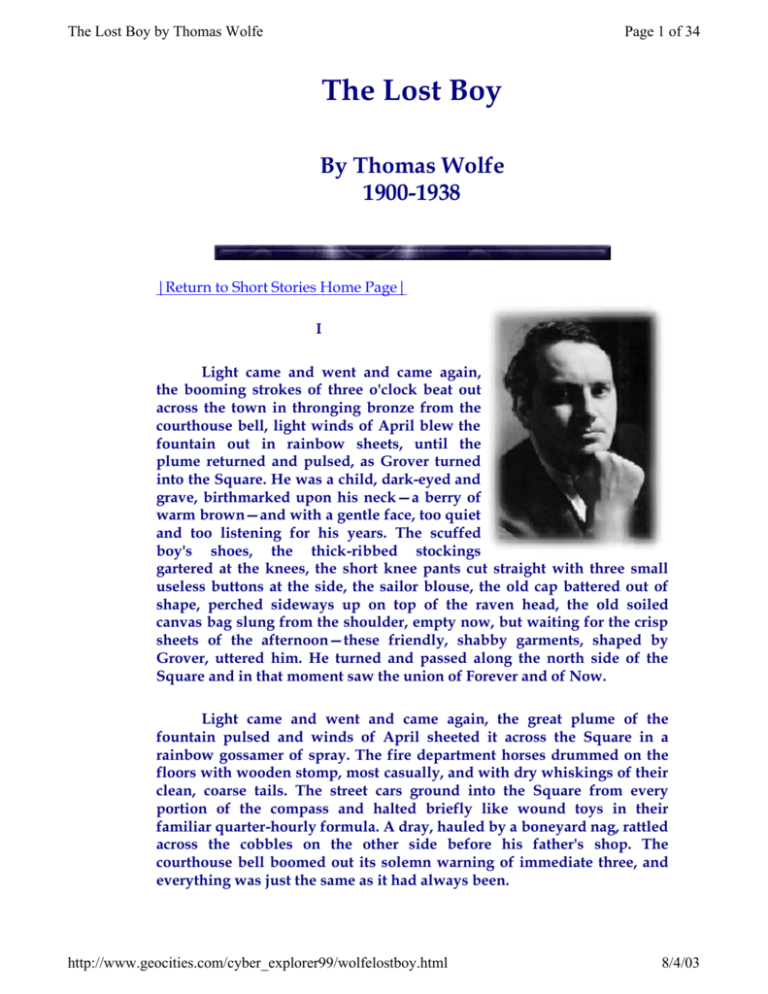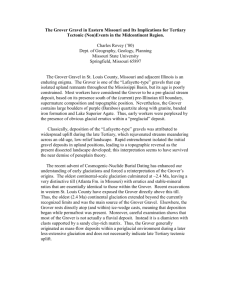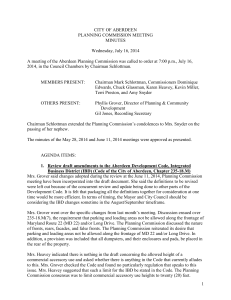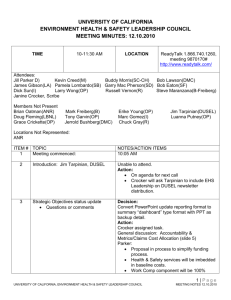The Lost Boy - Weber State University
advertisement

The Lost Boy by Thomas Wolfe Page 1 of 34 The Lost Boy By Thomas Wolfe 1900-1938 |Return to Short Stories Home Page| I Light came and went and came again, the booming strokes of three o'clock beat out across the town in thronging bronze from the courthouse bell, light winds of April blew the fountain out in rainbow sheets, until the plume returned and pulsed, as Grover turned into the Square. He was a child, dark-eyed and grave, birthmarked upon his neck—a berry of warm brown—and with a gentle face, too quiet and too listening for his years. The scuffed boy's shoes, the thick-ribbed stockings gartered at the knees, the short knee pants cut straight with three small useless buttons at the side, the sailor blouse, the old cap battered out of shape, perched sideways up on top of the raven head, the old soiled canvas bag slung from the shoulder, empty now, but waiting for the crisp sheets of the afternoon—these friendly, shabby garments, shaped by Grover, uttered him. He turned and passed along the north side of the Square and in that moment saw the union of Forever and of Now. Light came and went and came again, the great plume of the fountain pulsed and winds of April sheeted it across the Square in a rainbow gossamer of spray. The fire department horses drummed on the floors with wooden stomp, most casually, and with dry whiskings of their clean, coarse tails. The street cars ground into the Square from every portion of the compass and halted briefly like wound toys in their familiar quarter-hourly formula. A dray, hauled by a boneyard nag, rattled across the cobbles on the other side before his father's shop. The courthouse bell boomed out its solemn warning of immediate three, and everything was just the same as it had always been. http://www.geocities.com/cyber_explorer99/wolfelostboy.html 8/4/03 The Lost Boy by Thomas Wolfe Page 2 of 34 He saw that haggis of vexed shapes with quiet eyes—that hodgepodge of ill-sorted architectures that made up the Square, and he did not feel lost. For "Here," thought Grover, "here is the Square as it has always been—and papa's shop, the fire department and the City Hall, the fountain pulsing with its plume, the street cars coming in and halting at the quarter hour, the hardware store on the corner there, the row of old brick buildings oil this side of the street, the people passing and the light that comes and changes and that always will come back again, and everything that comes and goes and changes in the Square, and yet will be the same again. And here," the boy thought, "is Grover with his paper bag. Here is old Grover, almost twelve years old. Here is the month of April, 1904. Here is the courthouse bell and three o'clock. Here is Grover on the Square that never changes. Here is Grover, caught upon this point of time." It seemed to him that the Square, itself the accidental mason many years, the chance agglomeration of time and of disrupted strivings, was the center of the universe. It was for him, in his soul's picture, the earth's pivot, the granite core of changelessness, the eternal place where all things came and passed, and yet abode forever and would never change. He passed the old shack on the corner—the wooden fire-trap where S. Goldberg ran his wiener stand. Then he passed the Singer place next door, with its gleaming display of new machines. He saw them and admired them, but he felt no joy. They brought back to him the busy hum of housework and of women sewing, the intricacy of stitch and weave, the mystery of style and pattern, the memory of women bending over flashing needles, the pedaled tread, the busy whir. It was women's work: it filled him with unknown associations of dullness and of vague depression. And always, also, with a moment's twinge of horror, for his dark eye would always travel toward that needle stitching up and down so fast the eye could never follow it. And then he would remember how his mother once had told him she had driven the needle through her finger, and always, when he passed this place, he would remember it and for a moment, crane his neck and turn his head away. He passed on then, but had to stop again next door before the music store. He always had to stop by places that had shining perfect things in them. He loved hardware stores and windows full of accurate geometric tools. He loved windows full of hammers, saws, and planing boards. He liked windows full of strong new rakes and hoes, with unworn handles, of white perfect wood, stamped hard and vivid with the maker's seal. He loved to see such things as these in the windows of hardware stores. And he would fairly gloat upon them and think that some day he would own a set himself. http://www.geocities.com/cyber_explorer99/wolfelostboy.html 8/4/03 The Lost Boy by Thomas Wolfe Page 3 of 34 Also, he always stopped before the music and piano store. It was a splendid store. And in the window was a small white dog upon his haunches, with head cocked gravely to one side, a small white dog that never moved, that never barked, that listened attentively at the flaring funnel of a horn to hear "His Master's Voice"—a horn forever silent, and a voice that never spoke. And within were many rich and shining shapes of great pianos, an air of splendor and of wealth. And now, indeed, he was caught, held suspended. A waft of air, warm, chocolate-laden, filled his nostrils. He tried to pass the white front of the little eight-foot shop; he paused, struggling with conscience; he could. not go on. It was the little candy shop run by old Crocker and his wife. And Grover could not pass. "Old stingy Crockers!" he thought scornfully. "I'll not go there any more. But—" as the maddening fragrance of rich cooking chocolate touched him once again—"I'll just look in the window and see what they've got." He paused a moment, looking with his dark and quiet eyes into the window of the little candy shop. The window, spotlessly clean, was filled with trays of fresh-made candy. His eyes rested on a tray of chocolate drops. Unconsciously he licked his lips. Put one of them upon your tongue and it just melted there, like honeydew. And then the trays full of rich homemade fudge. He gazed longingly at the deep body of the chocolate fudge, reflectively at maple walnut, more critically, yet with loning, at the mints, the nougatines, and all the other dainties. "Old stingy Crockers!" Grover muttered once again, and turned to go. "I wouldn't go in there again." And yet he did not go away. "Old stingy Crockers" they might be; still, they did make the best candy in town, the best, in fact, that he had ever tasted. He looked through the window back into the little shop and saw Mrs. Crocker there. A customer had gone in and had made a purchase, and as Grover looked he saw Mrs. Crocker, With her little wrenny face, her pinched features, lean over and peer primly at the scales. She had a piece of fudge in her clean, bony, little fingers, and as Grover looked, she broke it, primly, in her little bony hands. She dropped a morsel down into the scales. They weighted down alarmingly, and her thin lips tightened. She snatched the piece of fudge out of the scales and broke it carefully once again. This time the scales wavered, went down very slowly, and came back again. Mrs. Crocker carefully put the reclaimed piece of fudge back in the tray, dumped the remainder in a paper bag, folded it and gave it to the customer, counted the money carefully and doled it out into the till, http://www.geocities.com/cyber_explorer99/wolfelostboy.html 8/4/03 The Lost Boy by Thomas Wolfe Page 4 of 34 the pennies in one place, the nickels in another. Grover stood there, looking scornfully. "Old stingy Crocker—afraid that she might give a crumb away!" He grunted scornfully and again he turned to go. But now Mr. Crocker came out from the little partitioned place where they made all their candy, bearing a tray of fresh-made fudge in his skinny hands. Old Man Crocker rocked along the counter to the front and put it down. He really rocked along. He was a cripple. And like his wife, he was a wrenny, wizened little creature, with bony hands, thin lips, a pinched and meager face. One leg was inches shorter than the other, and on this leg there was an enormous thick-soled boot, with a kind of wooden, rocker-like arrangement, six inches high at least, to make up for the deficiency. On this wooden cradle Mr. Crocker rocked along, with a prim and apprehensive little smile, as if he were afraid he was going to lose something. "Old stingy Crocker!" muttered Grover. "Humph! He wouldn't give you anything!" And yet—he did not go away. He hung there curiously, peering through the window, with his dark and gentle face now focused and intent, alert and curious, flattening his nose against the glass. Unconsciously he scratched the thick-ribbed fabric of one stockinged leg with the scuffed and worn toe of his old shoe. The fresh, warm odor of the new-made fudge was delicious. It was a little maddening. Half consciously he began to fumble in one trouser pocket, and pulled out his purse, a shabby worn old black one with a twisted clasp. He opened it and prowled about inside. What he found was not inspiring—a nickel and two pennies and— he had forgotten them—the stamps. He took the stamps out and unfolded them. There were five twos, eight ones, all that remained of the dollarsixty-cents' worth which Reed, the pharmacist, had given him for running errands a week or two before. "Old Crocker," Grover thought, and looked somberly at the grotesque little form as it rocked back into the shop again, around the counter, and up the other side. "Well—" again he looked indefinitely at the stamps in his hand—"he's had all the rest of them. He might as well take these." So, soothing conscience with this sop of scorn, he went into the shop and stood looking at the trays in the glass case and finally decided. http://www.geocities.com/cyber_explorer99/wolfelostboy.html 8/4/03 The Lost Boy by Thomas Wolfe Page 5 of 34 Pointing with a slightly grimy finger at the fresh-made tray of chocolate fudge, he said, "I'll take fifteen cents' worth of this, Mr. Crocker." He paused a moment, fighting with embarrassment, then he lifted his dark face and said quietly, "And please, I'll have to give you stamps again." Mr. Crocker made no answer. He did not look at Grover. He pressed his lips together primly. He went rocking away and got the candy scoop, came back, slid open the door of the glass case, put fudge into the scoop, and, rocking to the scales, began to weigh the candy out. Grover watched him as he peered and squinted, he watched him purse and press his lips together, he saw him take a piece of fudge and break it in two parts. And then old Crocker broke two parts in two again. He weighed, he squinted, and he hovered, until it seemed to Grover that by calling Mrs. Crocker stingy he had been guilty of a rank injustice. But finally, to his vast relief, the job was over, the scales hung there, quivering apprehensively, upon the very hair-line of nervous balance, as if even the scales were afraid that one more move from Old Man Crocker and they would be undone. Mr. Crocker took the candy then and dumped it in a paper bag and, rocking back along the counter toward the boy, he dryly said: "Where are the stamps?" Grover gave them to him. Mr. Crocker relinquished his clawlike hold upon the bag and set it down upon the counter. Grover took the bag and dropped it in his canvas sack, and then remembered. "Mr. Crocker—" again he felt the old embarrassment that was almost like strong pain—"I gave you too much," Grover said. "There were eighteen cents in stamps. You—you can just give me three ones back." Mr. Crocker did not answer. He was busy with his bony little hands, unfolding the stamps and flattening them out on top of the glass counter. When he had done so, he peered at them sharply for a moment, thrusting his scrawny neck forward and running his eye up and down, like a bookkeeper who totes up rows of figures. When he had finished, he said tartly: "I don't like this kind of business. If you want candy, you should have the money for it. I'm not a post office. The next time you come in here and want anything, you'll have to pay me money for it." Hot anger rose in Grover's throat. His olive face suffused with angry color. His tarry eyes got black and bright. He was on the verge of saying: "Then why did you take my other stamps? Why do you tell me now, when you have taken all the stamps I had, that you don't want them?" http://www.geocities.com/cyber_explorer99/wolfelostboy.html 8/4/03 The Lost Boy by Thomas Wolfe Page 6 of 34 But he was a boy, a boy of eleven years, a quiet, gentle, gravely thoughtful boy, and he had been taught how to respect his elders. So he just stood there looking with his tar-black eyes. Old Man Crocker, pursing at the mouth a little, without meeting Grover's gaze, took the stamps up in his thin, parched fingers and, turning, rocked away with them down to the till. He took the twos and folded them and laid them in one rounded scallop, then took the ones and folded them and put them in the one next to it. Then he closed the till and started to rock off, down toward the other end. Grover, his face now quiet and grave, kept looking at him, but Mr. Crocker did not look at Grover. Instead he began to take some stamped cardboard shapes and fold them into boxes. In a moment Grover said, "Mr. Crocker, will you give me the three ones, please?" Mr. Crocker did not answer. He kept folding boxes, and he compressed his thin lips quickly as he did so. But Mrs. Crocker, back turned to her spouse, also folding boxes with her birdlike hands, muttered tartly: "Hm. I'd give him nothing!" Mr. Crocker looked up, looked at Grover, said, "What are you waiting for?" "Will you give me the three ones, please?" Grover said. "I'll give you nothing," Mr. Crocker said. He left his work and came rocking forward along the counter. "Now you get out of here! Don't you come in here with any more of those stamps," said Mr. Crocker. "I should like to know where he gets them—that's what I should like to know," said Mrs. Crocker. She did not look up as she said these words. She inclined her head a little to the side, in Mr. Crocker's direction, and continued to fold the boxes with her bony fingers. "You get out of here!" said Mr. Crocker. "And don't you come back here with any stamps.... Where did you get those stamps?" he said. http://www.geocities.com/cyber_explorer99/wolfelostboy.html 8/4/03 The Lost Boy by Thomas Wolfe Page 7 of 34 "That's just what I've been thinking," Mrs. Crocker said. "I've been thinking all along." "You've been coming in here for the last two weeks with those stamps," said Mr. Crocker. "I don't like the look of it. Where did you get those stamps?" he said. time. "That's what I've been thinking," said Mrs. Crocker, for a second Grover had got white underneath his olive skin. His eyes had lost their luster. They looked like dull, stunned balls of tar. "From Mr. Reed," he said. "I got the stamps from Mr. Reed." Then he burst out desperately: "Mr. Crocker—Mr. Reed will tell you how I got the stamps. I did some work for Mr. Reed, he gave me those stamps two weeks ago." "Mr. Reed," said Mrs. Crocker acidly. She did not turn her head. "I call it mighty funny." "Mr. Crocker," Grover said, "if you'll just let me have three ones—" "You get out of here!" cried Mr. Crocker, and he began rocking forward toward Grover. "Now don't you come in here again, boy! There's something funny about this whole business! I don't like the look of it," said Mr. Crocker. "If you can't pay as other people do, then I don't want your trade." "Mr. Crocker," Grover said again, and underneath the olive skin his face was gray, "if you'll just let me have those three—" "You get out of here!" Mr. Crocker cried, rocking down toward the counter's end. "If you don't get out, boy—" "I'd call a policeman, that's what I'd do," Mrs. Crocker said. Mr. Crocker rocked around the lower end of the counter. He came rocking up to Grover. "You get out," he said. He took the boy and pushed him with his bony little hands, and Grover was sick and gray down to the hollow pit of his stomach. "You've got to give me those three ones," he said. http://www.geocities.com/cyber_explorer99/wolfelostboy.html 8/4/03 The Lost Boy by Thomas Wolfe Page 8 of 34 "You get out of here!" shrilled Mr. Crocker. He seized the screen door, pulled it open, and pushed Grover out. "Don't you come back in here," he said, pausing for a moment, and working thinly at the lips. He turned and rocked back in the shop again. The screen door slammed behind him. Grover stood there on the pavement. And light came and went and came again into the Square. The boy stood there, and a wagon rattled past. There were some people passing by, but Grover did not notice them. He stood there blindly, in the watches of the sun, feeling this was Time, this was the center of the universe, the granite core of changelessness, and feeling, this is Grover, this the Square, this is Now. But something had gone out of day. He felt the overwhelming, soul-sickening guilt that all the children, all the good men of the earth, have felt since Time began. And even anger had died down, had been drowned out, in this swelling tide of guilt, and "This is the Square"— thought Grover as before—"This is Now. There is my father's shop. And all of it is as it has always been—save I." And the Square reeled drunkenly around him, light went in blind gray motes before his eyes, the fountain sheeted out to rainbow iridescence and returned to its proud, pulsing plume again. But all the brightness had gone out of day, and "Here is the Square, and here is permanence, and here is Time—and all of it the same as it has always been, save I." The scuffed boots of the lost boy moved and stumbled blindly. The numb feet crossed the pavement—reached the cobbled street, reached the plotted central square—the grass plots, and the flower beds, so soon to be packed with red geraniums. "I want to be alone," thought Grover, "where I cannot go near him.... Oh God, I hope he never hears, that no one ever tells him—" The plume blew out, the iridescent sheet of spray blew over him. He passed through, found the other side and crossed the street, and—"Oh God, if papa ever hears!" thought Grover, as his numb feet started up the steps into his father's shop. He found and felt the steps—the width and thickness of old lumber twenty feet in length. He saw it all—the iron columns on his father's porch, painted with the dull anomalous black-green that all such columns in this land and weather come to; two angels, flyspecked, and the waiting http://www.geocities.com/cyber_explorer99/wolfelostboy.html 8/4/03 The Lost Boy by Thomas Wolfe Page 9 of 34 stones. Beyond and all around, in the stonecutter's shop, cold shapes of white and marble, rounded stone, the languid angel with strong marble hands of love. He went on down the aisle, the white shapes stood around him. He went on to the back of the workroom. This he knew—the little cast-iron stove in the left-hand corner, caked, brown, heat-blistered and the elbow of the long stack running out across the shop; the high and dirty window looking down across the Market Square toward Niggertown; the rude old shelves, plank-boarded, thick, the wood not smooth but pulpy, like the strong hair of an animal; upon the shelves the chisels of all sizes and a layer of stone dust; an emery wheel with pump tread; and a door that let out on the alleyway, yet the alleyway twelve feet below. Here in the room, two trestles of this coarse spiked wood upon which rested gravestones, and at one, his father at work. The boy looked, saw the name was Creasman: saw the carved analysis of John, the symmetry of the s, the fine sentiment that was being polished off beneath the name and date: "John Creasman, November 7, 1903." Gant looked up. He was a man of fifty-three, gaunt-visaged, mustache cropped, immensely long and tall and gaunt. He wore good dark clothes—heavy, massive—save he had no coat. He worked in shirt-sleeves with his vest on, a strong watch chain stretching across his vest, wing collar and black tie, Adam's apple, bony forehead, bony nose, light eyes, gray-green, undeep and cold, and, somehow, lonely-looking, a striped apron going up around his shoulders, and starched cuffs. And in one hand a tremendous rounded wooden mallet like a butcher's bole; and in his other hand, a strong cold chisel. "How are you, son?" He did not look up as he spoke. He spoke quietly, absently. He worked upon the chisel and the wooden mallet, as a jeweler might work on a watch, except that in the man and in the wooden mallet there was power too. "What is it, son?" he said. He moved around the table from the head, started up on "J" once again. "Papa, I never stole the stamps," said Grover. http://www.geocities.com/cyber_explorer99/wolfelostboy.html 8/4/03 The Lost Boy by Thomas Wolfe Page 10 of 34 Gant put down the mallet, laid the chisel down. He came around the trestle. "What?" he said. As Grover winked his tar-black eyes, they brightened, the hot tears shot out. "I never stole the stamps," he said. "Hey? What is this?" his father said. "What stamps?" "That Mr. Reed gave me, when the other boy was sick and I worked there for three days. . . . And Old Man Crocker," Grover said, "he took all the stamps. And I told him Mr. Reed had given them to me. And now he owes me three ones—and Old Man Crocker says he don't believe that they were mine. He says—he says—that I must have taken them somewhere," Grover blurted out. "The stamps that Reed gave you—hey?" the stonecutter said. "The stamps you had—" He wet his thumb upon his lips, threw back his head and slowly swung his gaze around the ceiling, then turned and strode quickly from his workshop out into the storeroom. Almost at once he came back again, and as he passed the old gray painted-board partition of his office he cleared his throat and wet his thumb and said, "Now, I tell you—" Then he turned and strode up toward the front again and cleared his throat and said, I tell you now—" He wheeled about and started back, and as he came along the aisle between the marshaled rows of gravestones he said beneath his breath, "By God, now—" He took Grover by the hand and they went out flying. Down the aisle they went by all the gravestones, past the fly-specked angels waiting there, and down the wooden steps and across the Square. The fountain pulsed, the plume blew out in sheeted iridescence, and it swept across them; an old gray horse, with a peaceful look about his torn lips, swucked up the cool mountain water from the trough as Grover and his father went across the Square, but they did not notice it. They crossed swiftly to the other side in a direct line to the candy shop. Gant was still dressed in his long striped apron, and he was still holding Grover by the hand. He opened the screen door and stepped inside. http://www.geocities.com/cyber_explorer99/wolfelostboy.html 8/4/03






